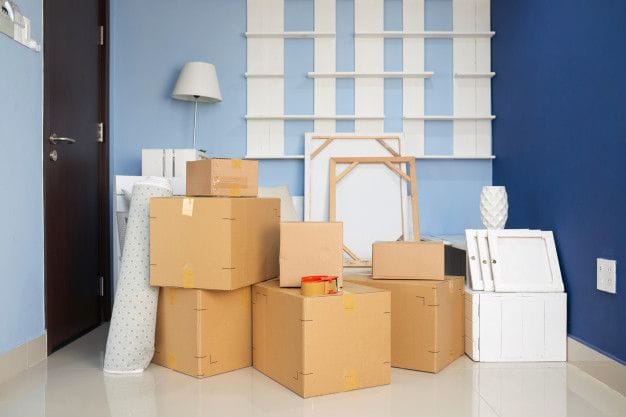Preparing your home to go on the real estate market used to simply involve a fresh coat of paint and completing the “Honey-Do” list of small home repairs. However, with the increasingly competitive housing market, staging one’s home has gone to new levels.
A well-staged home, one that will garner the best offers, needs to look like a model home where no one lives—even while a family still lives there. As a result, staging your home involves some deep cleaning and de-cluttering.
Fortunately, with the right planning, you can make the most of staging your home before transitioning to your new home. Follow these steps for the most seamless transition from your current home to your new home.
Step 1: Stay Organized
To stage your home well, you’ll be de-cluttering, packing, and storing items. This is the best time to start a Moving Notebook. Digital or physical, your Moving Notebook will help you keep track of everything—important documents related to the sale and purchase of your old and new home; inventory of stored items; and a calendar/countdown to moving day. A good moving day calendar should be at least 6 weeks long. If it extends to the selling and buying stages of moving, it will be many months long. A well-organized Moving Notebook will keep you focused and on schedule without becoming overwhelmed.
Step 2: Do Some De-cluttering
De-cluttering is the answer to both a well-staged home and a smoother, less expensive move. Staged homes are sparse and open to make the most of the home’s light and square footage. And when it is time to move into your new home, the less volume you have to move, the lower your moving bill will be. So get the most bang for your buck by categorizing your belongings into three groups: throw away, sell and/or donate, and keep. Ideally, the first two groups have been removed from your home by the time you begin the next step.
Step 3: Begin Packing
While your home is staged for sale, you and your family will still be living there, so you cannot pack up your entire home. However, there are plenty of items you won’t need during the short period of time your home is on the market, and now is the best time to begin packing these items. Seasonal items such as holiday décor and sports equipment can be packed up as well as infrequently used items such as fine china, some kitchen appliances, and books and games. Empty and pack up storage closets, attics, and/or the garage. Too much work? You could consider hiring professionals to pack for you.
Step 4: Stage Your Home
It is time to stage your home, presenting it as a model home to potential buyers. That means de-personalizing your home and creating openness and light in every room. Practically, that means clearing countertops in the kitchen, your dresser and desk, and bathroom and garage. With your recently emptied spaces from the previous step, you’ll have no problem finding a temporary home for all the items that are usually on display. As a result, your home will be able to show off all its square footage and potential in the best light possible to prospective buyers, even while you continue to live in it comfortably.
Step 5: Temporary Storage
Now that you have packed up and cleared out part of your belongings to create the perfectly staged home, you will need to find a temporary home for these items until you move into your new home. There are a few good options to choose from depending on the volume of items you are storing.
If you only need to store a few items or boxes, perhaps a friend or family member will let you keep them at their place for a few months. Other options include renting a storage unit, which can accommodate small and large items.
Alternately, by choosing a moving company early, you can save a few steps by having a mover that provides storage. In addition to the benefit of having all your belongings—the stored items as well as the items you didn’t clear out—arrive via the same hands on the same day to your new home, many companies will offer package pricing when you take advantage of more than one of their services.
No matter which option best fits your needs and budget, do your research, and only entertain bids from companies that are reputable and provide 24/7 security. Your items are important to you no matter their dollar value, so you should partner with a company that treats your valuables like their own.

